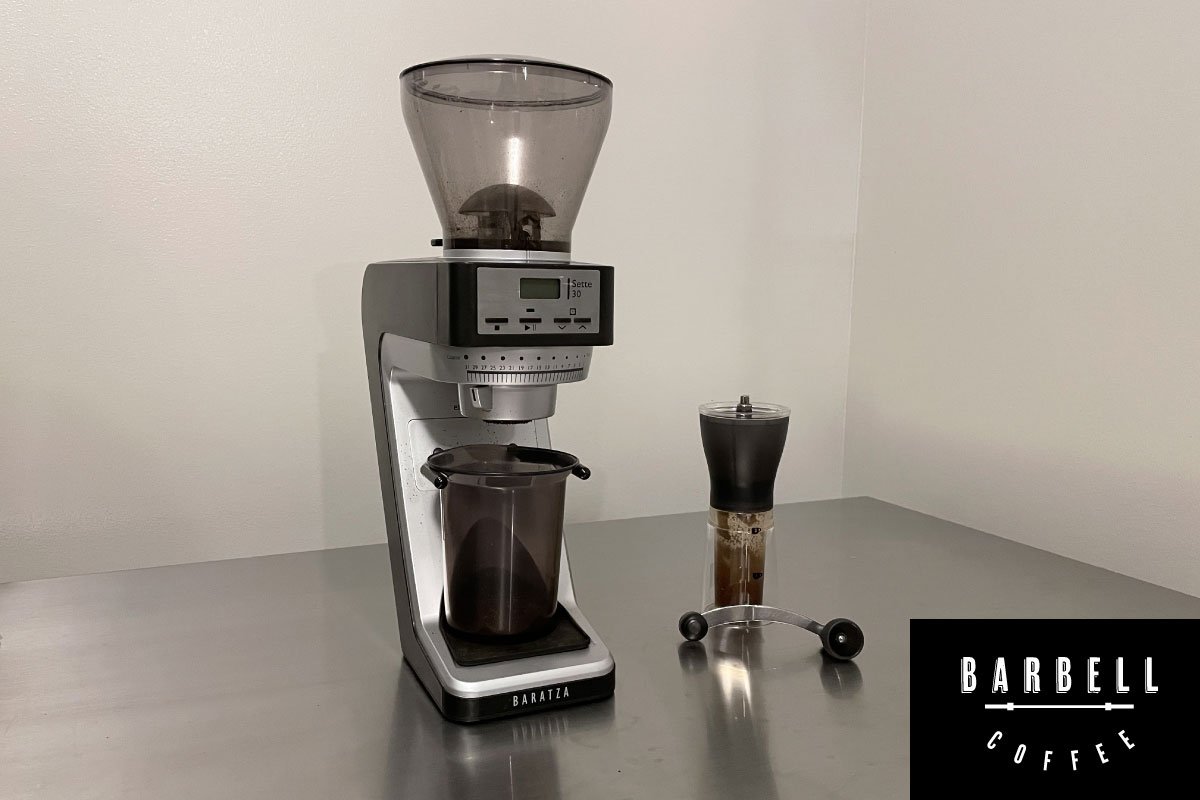Choosing a Coffee Grinder
The electric (left) and manual (right) burr grinders used for our brews at BARBELL COFFEE.
Grinding your own coffee beans is the quickest and easiest way to up your coffee game.
Grinding your own coffee produces immediate coffee-drinking-experience returns. First, the aroma is awesome. Second, it increase the longevity of your coffee with regards to freshness - not that you’re letting your bag of BARBELL COFFEE sit on the shelf to long. Pre-ground coffee starts to lose freshness the minute it’s ground. There’s no amount of vacuum sealing or impulse sealing that can “lock in” the same fresh roasted quality that whole bean coffee offers. The freshly roasted, unground bean is already perfectly made to “lock in” freshness as long as it’s stored properly - like in an air-tight, light blocking, resealable bag, which is what we use.
Third, it just tastes better. Plain and simple - freshly ground coffee will taste better that pre-ground coffee.
Types of Grinders: Burr vs Blade
The short answer: If given the option, choose a burr grinder. Now to get into the details.
A burr grinder grinds coffee by sending the beans through two burrs, either conical or flat, which grind the beans into even pieces. “Even pieces” being the key phrase. This is important because this way your coffee is uniformly ground, meaning you don’t get some pieces ground to dust and others ground into chunks.
A blade grinder works a lot like a blender or food processor. A blade at the bottom of the grinder chops the beans continuously until the desired coarseness is achieved.
Pros & Cons, BURR
Pro: As stated above, a burr grinder gives you a consistent and uniform grind - something a blade grinder can’t do - as well as control over how coarse or fine the coffee should be. A uniform grind and control matter because it means you get a more consistent extraction during the brewing process, which also matters depending on how you’re going to brew your coffee. Different brewing methods call for either fine or coarse coffee. For example, a French press requires coarse ground coffee. While an espresso machine requires extremely fine ground coffee - something only achievable with a burr grinder.
Con: Cost. Burr mill grinders cost more. Also, not all burr grinders can achieve the extremely fine grind that espresso requires. Meaning, if you want to grind for esspresso, you’ll have to buy one that can actually can grind that fine, which usually means you’ll have to spend a little more money. That said, if you don’t need to grind for espresso, you can get a manual burr grinder - which will get you a grind that’s coarse or fine enough for most drip, pour over, and French press - for around $30. (…You’ll also get an arm workout with that manual grinder!)
Pros & Cons, Blade
Pro: Cost. Blade grinders are more affordable than most all burr grinders. They start around $20. I wouldn’t go too cheap though.
Con: You have less control over the coarseness, and you can’t achieve a uniform grind with a blade grinder. Some pieces will be big and coarse, other prices will be fine dust or powder.
The Bottom Line
If you have the choice, go with a burr grinder 100% of the time. That said, if you don’t have access to a burr grinder, a blade grinder will do because grinding your own coffee is always better than pre-ground coffee.
My recommendations
These are all grinders I’ve used in the past and/or still use.
Top-Pick Electric Burr Grinder: Baratza Encore Conical Burr Coffee Grinder
Works great for most all at-home basic brewing methods including auto drip, pour over/Chemex, French press, and espresso.
While it’s not as quite as a manual grinder, it’s quieter than most electric grinders.
The burrs are fully serviceable and replaceable if they wear out (depending on how long you keep the unit).
Freshness tip: Don’t store your beans in the hopper. Just pour in as much as you need to grind.
Budget-Friendly Electric Burr Grinder: Mr. Coffee Automatic Burr Mill Coffee Grinder (old version…and yes. Mr. Coffee. We’re not coffee snobs here at BARBELL COFFEE)
Works great for most at-home basic brewing methods including auto drip, pour over/Chemex, and French press.
Will not grind fine enough for espresso machines.
Freshness tip: Don’t store your beans in the hopper. Just pour in as much as you need to grind.
Not-So-Budget-Friendly Burr Grinder (but worth the price): Baratza Sette 30 Conical Burr Grinder
Works great for most all at-home basic brewing methods including auto drip, pour over/Chemex, French press, and espresso. This is our current go-to.
The burrs are fully serviceable and replaceable if they wear out (depending on how long you keep the unit).
Freshness tip: Don’t store your beans in the hopper. Just pour in as much as you need to grind.
Manual Burr Grinder: Hario Ceramic Coffee Mill
Works well for 1 - 2 coffee drinkers. I wouldn’t recommend this for a full pot of coffee. Manually grinding coffee is kinda slow and labor intensive (relatively speaking). It’s takes me about 30-seconds to grind enough coffee for one mug of coffee (about 12 - 16 oz).
It’s great if you have sleeping children or just don’t want to wake anyone up by grinding your coffee.
Will grind coarse enough for a French press or fine enough for a auto drip or pour over/Chemex. Will not grind fine enough for espresso machines.
Electric Blade Grinder: Mr. Coffee 12 Cup Electric Coffee Grinder with Multi Settings
Long story short, it will get the job done. But if I could choose, I would save my money and use it to buy the Mr. Coffee burr grinder mentioned above.






